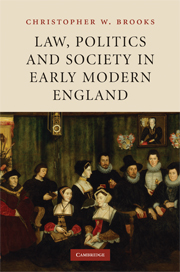Book contents
- Frontmatter
- Contents
- Preface
- Abbreviations and conventions
- 1 English history and the history of English law 1485–1642
- 2 Courts, lawyers and legal thought under the early Tudors
- 3 The initiatives of the crown and the break from Rome
- 4 Political realities and legal discourse in the later sixteenth century
- 5 The politics of jurisdiction I: the liberty of the subject and the ecclesiastical polity 1560 – c. 1610
- 6 The politics of jurisdiction II: multiple kingdoms and questions about royal authority
- 7 The absoluta potestas of a sovereign and the liberty of the subject: law and political controversy in the 1620s
- 8 The degeneration of civil society into a state of war 1629–1642
- 9 Law and ‘community’
- 10 The aristocracy, the gentry and the rule of law
- 11 Economic and tenurial relationships
- 12 The household and its members
- 13 The person, the community and the state
- 14 Conclusion
- Manuscript bibliography
- Index
- References
12 - The household and its members
Published online by Cambridge University Press: 06 July 2010
- Frontmatter
- Contents
- Preface
- Abbreviations and conventions
- 1 English history and the history of English law 1485–1642
- 2 Courts, lawyers and legal thought under the early Tudors
- 3 The initiatives of the crown and the break from Rome
- 4 Political realities and legal discourse in the later sixteenth century
- 5 The politics of jurisdiction I: the liberty of the subject and the ecclesiastical polity 1560 – c. 1610
- 6 The politics of jurisdiction II: multiple kingdoms and questions about royal authority
- 7 The absoluta potestas of a sovereign and the liberty of the subject: law and political controversy in the 1620s
- 8 The degeneration of civil society into a state of war 1629–1642
- 9 Law and ‘community’
- 10 The aristocracy, the gentry and the rule of law
- 11 Economic and tenurial relationships
- 12 The household and its members
- 13 The person, the community and the state
- 14 Conclusion
- Manuscript bibliography
- Index
- References
Summary
Public and private interests
In the 1620s, the Puritan lawyer Henry Sherfield evidently felt completely comfortable in describing his relationship to God in contractual language that referred to the terms of a conditional bond between them. By the time of the outbreak of the civil wars, the occupation of land was increasingly seen largely as a commercial relationship between landlord and tenant. Thus in terms of both obligations and tenures, early modern men (and women, too) apparently exercised considerable individual agency, and this was matched by an increasing acknowledgment in public rhetoric and political thought that individuals might expect to have ‘private’ interests that were distinct from those of the ‘state’ or the community at large.
In fact, the distinction between public and private interests was implicit in some of the standard views expressed from time to time about the origins of political society itself, namely that it was the heads of households (patriarchs) who had eschewed a warlike state of nature to live under a rule of law that would protect their property and their families. Thus the early seventeenth-century judge Sir John Dodderidge on at least one occasion explained to grand jurors that commonwealths were essentially aggregations of ‘private families’. Apparently following Aristotle, he then went on to divide the law into that part which dealt with the polity in general, and that which dealt with ‘oeconomick’, or household, matters concerning the ‘private carriage of each man in his particular domain’.
- Type
- Chapter
- Information
- Law, Politics and Society in Early Modern England , pp. 352 - 384Publisher: Cambridge University PressPrint publication year: 2009



